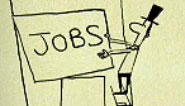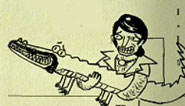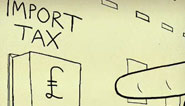Find out more about The Open University's Economics courses.
Transcript: Of all the things to factor in when running an economy, the most troublesome is people. Now by and large – humans are a rational lot. When the price of something rises people will supply more of it – and buy less of it.
If they expect inflation to go up – people will usually ask for higher wages – (though they might not get them) And if they can see interest or exchange rates falling in one country, people with lots of money there will try to move it out, faster than you can say ‘double dip’. And governments often decide their economic policies assuming such rational actions.
Which would be great, if it weren’t for the fact that those pesky humans don’t always do what’s best for them. Sometimes they mistakenly think they know all the facts, or maybe the facts are just too complicated And sometimes people just decide to follow the crowd, relying on others to know what they’re doing.
When too many cheap mortgages were being sold in 2007 – a lot of people didn’t know what was going on. And a lot of others just followed the crowd. Some lenders may have rationally believed that, when the crunch came, the scale of the problem would force governments to rescue them. Which was true for the banks. If not for all their customers.
Got another 60 seconds?
-
60 second adventures in economics: The Invisible Hand
Watch now to access more details of 60 second adventures in economics: The Invisible HandIn the first of our six short videos on economic theory, watch how an Invisible Hand drives the economy. Eventually.

Video
Level: 1 Introductory
-
60 second adventures in economics: The Paradox Of Thrift
Watch now to access more details of 60 second adventures in economics: The Paradox Of ThriftIs it better to save or to spend? According to Keynes, if you don't spend, you're going to make the economy even worse. This animations explains more in just one-minute.

Video
Level: 1 Introductory
-
60 second adventures in economics: The Phillips Curve
Watch now to access more details of 60 second adventures in economics: The Phillips CurveBob Phillips took some time out of crocodile hunting to have a stab at explaining how wages, prices and unemployment interplay.

Video
Level: 1 Introductory
-
60 second adventures in economics: The Principle Of Comparative Advantage
Watch now to access more details of 60 second adventures in economics: The Principle Of Comparative AdvantageWhy do countries sign free trade agreements? It's not just because they get to keep the pens, but to try to take advantage of their comparative advantage.

Video
Level: 1 Introductory
-
60 second adventures in economics: The Impossible Trinity
Watch now to access more details of 60 second adventures in economics: The Impossible TrinityNations want it all - currency flows, low interest rates and stable exchange rates. Dream on, nations, you've got to choose.

Video
Level: 1 Introductory
Got more than 60 seconds? Try these FREE courses...
-
Economics and the 2008 crisis: a Keynesian view
Learn more to access more details of Economics and the 2008 crisis: a Keynesian viewThis free course, Economics and the 2008 crisis: a Keynesian view, looks at how Keynes's theories revolutionised thinking about the causes of crises and unemployment. Keynes's thinking on how to reduce these problems was very influential with economists and policy makers for several decades following the 1930s. The economic downturn that started...

Free course
28 hours
Level: 2 Intermediate
-
Economics explains discrimination in the labour market
Learn more to access more details of Economics explains discrimination in the labour marketDiscrimination in the labour market exists in many forms: the 'glass ceiling', ageism, racism, and so on. This free course, Economics explains discrimination in the labour market, will help you look at this problem from a new perspective: through economics. You will learn how economists have tried to understand what drives this distortion of the...

Free course
8 hours
Level: 3 Advanced
-
Rent or buy? The challenge of access to housing
Learn more to access more details of Rent or buy? The challenge of access to housingEveryone needs a place they call home and housing costs are usually your largest outgoing. Many aspire to buy, but rising house prices, while good news for existing owners, put homeownership beyond the reach of others. This free course, Rent or buy? The challenge of access to housing, addresses some of the most important decisions that ...

Free course
8 hours
Level: 1 Introductory
Rate and Review
Rate this video
Review this video
Log into OpenLearn to leave reviews and join in the conversation.
Video reviews